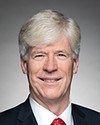Mr. Speaker, I too rise to pay tribute to a remarkable Canadian whose contributions have transcended the arenas of sport, public service and social advocacy, the Hon. Ken Dryden. I do so not just as a member of Parliament, but as a kid who grew up in Montreal watching Ken Dryden play for the Canadiens. I have a personal connection to the Dryden family by way of my wife's family, who lived not too far from Murray, Margaret, Ken, Dave and Judy's home in central Etobicoke on Pinehurst Crescent. My mother-in-law Jean Berry served on the board of Ken's dad's charity, Sleeping Children Around the World, and edited Murray's book With God Nothing is Impossible.
When Lynda and Ken moved back to Toronto, my wife Liane babysat their two children while they searched for a home. I had the occasion to visit Dryden's childhood home several times in Islington with my mother-in-law, and the home later became a warehouse of bed kits for Murray's charity. What struck me was that Murray had paved the backyard so young Ken and Dave could hone their skills in net with the neighbourhood kids, who, as I was told by Murray, would gather often to play ball hockey and ice hockey in the winter. The nets were still there when I visited. Members can imagine how I felt seeing the very spot where my hockey hero, the member for Foothills's hero and many of our Quebec colleagues' hero learned the art of being a goaler.
Dave Stubbs of NHL.com wrote that Dryden was “never a conventional goaltender. Not with his lanky, even gangly body type, accentuated even more by his stand-up style of play”. I thought about that as I stood in the Dryden backyard. In fact, his style was so unconventional that “legendary Boston Bruins and New York Rangers sniper Phil Esposito...during the 1971 Stanley Cup Playoffs was so frustrated by Dryden stoning the Bruins in an NHL Quarterfinals upset that he grumbled about the goalie having ‘arms like a giraffe.’” More than half a century later, Esposito revisited the confusing comparison to a giraffe's anatomy after Dryden's death and said, “OK, maybe [he had] the legs of a giraffe.”
Much has been said about his hockey accomplishments since his passing on September 5: the Stanley Cups he won, the Vezina Trophy, the Conn Smythe Trophy, the 1972 Summit Series and being drafted by the Boston Bruins in the 1964 NHL draft, which he did find out until the mid-seventies because it was a much simpler time back then, with no cellphones, no Internet and no hockey database websites. However, it is what he accomplished outside of playing hockey that has been so intriguing.
The legendary American broadcaster Al Michaels, who Dryden was sitting beside during the Miracle on Ice, when arguably the greatest call in sports history was made, referred to Ken recently on a podcast as a “Renaissance man” who knew everything about everything.
Father Raymond J. de Souza, in the National Post, said of Dryden, “In team sports, no one ever packed so much achievement into as few years (only eight seasons) as did Dryden—six Stanley Cups plus the 1972 Soviet series.” He said, “Only Michael Jordan was comparable, but the 1992 U.S. basketball ‘dream team’ was not nearly as important as the 1972 series.”
Surprisingly, Ken Dryden was at his best and most impressive off, not on, the ice. There are many excellent hockey players out there, but none was as skilled at analyzing the public sphere and, ultimately, at serving the public within the federal cabinet.
J. de Souza noted that Ken Dryden “spent a year...in classrooms as Ontario's youth commissioner to more fully understand the challenges of education.” He went on to say:
He moved into a middle-class home for a week to observe what life was like for a typical Toronto family in the early '90s. His novel of that experience, “The Moved and the Shaken”...[was] a reminder in public policy, in journalism, in culture, to pay attention not only to the movers and the shakers, but those whom they move and shake.
We would be wise to let that be a reminder to all of us as we contemplate the decisions we make and the impact they have on our fellow Canadians.
Like every kid growing up back when Ken Dryden was goalie for the Montreal Canadiens, he inspired countless people to play that position in the streets or on the ice, and to strike the Dryden pose when resting, blocker against stick, as immortalized by statues in Montreal and in the Hockey Hall of Fame.
As de Souza wrote this week, “What other sports figure is sculpted at rest rather than in action? It’s the sports version of Auguste Rodin's ‘The Thinker’ because Dryden was the great sportsman-thinker of his time, perhaps any time.”
There was never any doubt about the way that Ken Dryden lived his life or that he believed in miracles. A larger-than-life figure, he was curious, humble and respectful of the many people he met along his miraculous journey, including a young boy who grew up on 6th Avenue in Verdun and idolized Ken Dryden. He loved Canada and everything that Canada aspired to be.
Finally, having met his dad, Murray, on several occasions, and knowing the impact he had on so many lives around the world, I am not surprised Ken lived his life the way he did. Murray and Margaret Dryden taught Ken well, and it showed in who he was as a person and in everything he did.
On behalf of our Conservative team and our leader, with great respect and admiration for a truly remarkable Canadian, and Canadien, we send our condolences to Lynda and the entire Dryden family. May Ken rest, in his famous pose, in peace.


















